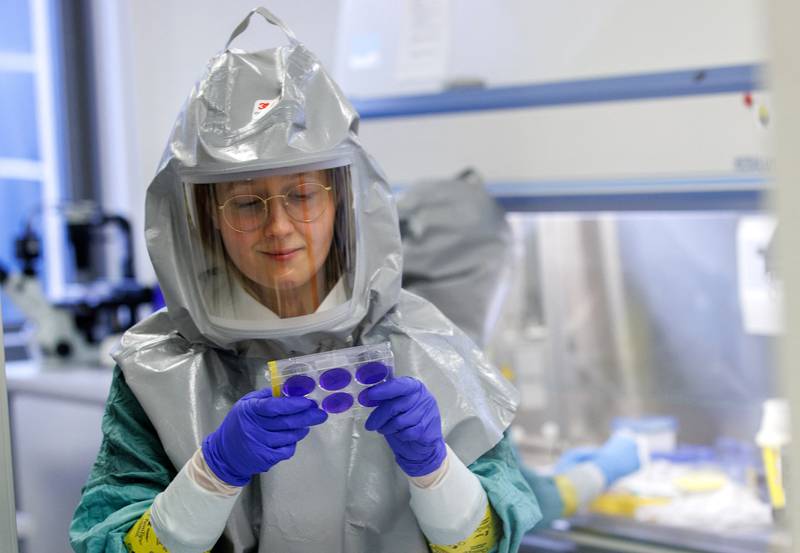Valneva approved as UK's sixth Covid vaccine

The UK has approved its sixth Covid vaccine, giving the go-ahead for Valneva’s shot to be added to its protective arsenal. The clearance “follows a rigorous review of the safety, quality and effectiveness of this vaccine”, said June Raine, chief executive of the Medicines and Healthcare products Regulatory Agency. Bahrain granted Valneva's vaccine emergency use authorisation in early March.
Valneva uses an inactivated version of the virus to stimulate an immune response, a traditional technology that is widely used in the production of flu and polio vaccines.
The vaccine is approved for use in people aged 18-50 with the two doses to be taken at an interval of at least 28 days. The vaccine can be stored at fridge temperature, meaning it can be used in countries where storage at very low temperatures is not available.Read More : Valneva Covid vaccine approved for use in UK The UK approval comes well over a year after the clearance of messenger-RNA shots developed by Moderna and the partnership between Pfizer and Germany’s BioNTech SE. Billions of those shots have already been administered worldwide.
It comes as the number of deaths involving coronavirus registered each week in England and Wales continues to rise, although levels remain well below those reached during previous waves of the virus.
The NHS Confederation has said very high rates of Covid-19 infections are having a "major impact" on the health service, which is facing pressures it would see in a "bad winter", well into spring. But Downing Street has rejected the call to reintroduce greater mask-wearing and a push to encourage mixing outdoors.
After backing the development of Valneva’s vaccine, Britain in September cancelled an order for 100 million doses because of a "breach of obligations".
Valneva has a factory in Livingston, near Edinburgh. The former chairwoman of the country's vaccine taskforce last year said government may have "acted in bad faith" in the way it cancelled the deal for the Valneva vaccine.
Dame Kate Bingham, who stood down from her role at the end of 2020, criticised the decision to pull out of the agreement before Valneva had finished clinical testing of the vaccine.
The decision was not only a blow to international pandemic efforts, but would dampen the UK's resilience to future disease outbreaks, Dame Kate said in a speech at the University of Oxford in November.
Healthcare investment expert Samir Devani, managing director at Rx Securities, said even after the mass roll-out, Valneva's vaccine could still be useful if a new variant arises.
"The fact that it is available on hand is good news, although the exact revenue profile beyond the orders already received from the EU and Bahrain remains unclear," he said.
Mr Devani said the approval bodes well for the decision from the EU's human medicines committee, which is assessing the drug after the European Commission signed an advance deal for up to 60 million doses.
Valneva said in March it expected a positive European Medicines Agency recommendation this month and that it had begun manufacturing and has inventory ready for labelling and distribution once it is is approved there.
Valneva uses an inactivated version of the virus to stimulate an immune response, a traditional technology that is widely used in the production of flu and polio vaccines.
The vaccine is approved for use in people aged 18-50 with the two doses to be taken at an interval of at least 28 days. The vaccine can be stored at fridge temperature, meaning it can be used in countries where storage at very low temperatures is not available.
It comes as the number of deaths involving coronavirus registered each week in England and Wales continues to rise, although levels remain well below those reached during previous waves of the virus.
The NHS Confederation has said very high rates of Covid-19 infections are having a "major impact" on the health service, which is facing pressures it would see in a "bad winter", well into spring. But Downing Street has rejected the call to reintroduce greater mask-wearing and a push to encourage mixing outdoors.
After backing the development of Valneva’s vaccine, Britain in September cancelled an order for 100 million doses because of a "breach of obligations".
Valneva has a factory in Livingston, near Edinburgh. The former chairwoman of the country's vaccine taskforce last year said government may have "acted in bad faith" in the way it cancelled the deal for the Valneva vaccine.
Dame Kate Bingham, who stood down from her role at the end of 2020, criticised the decision to pull out of the agreement before Valneva had finished clinical testing of the vaccine.
The decision was not only a blow to international pandemic efforts, but would dampen the UK's resilience to future disease outbreaks, Dame Kate said in a speech at the University of Oxford in November.
Healthcare investment expert Samir Devani, managing director at Rx Securities, said even after the mass roll-out, Valneva's vaccine could still be useful if a new variant arises.
"The fact that it is available on hand is good news, although the exact revenue profile beyond the orders already received from the EU and Bahrain remains unclear," he said.
Mr Devani said the approval bodes well for the decision from the EU's human medicines committee, which is assessing the drug after the European Commission signed an advance deal for up to 60 million doses.
Valneva said in March it expected a positive European Medicines Agency recommendation this month and that it had begun manufacturing and has inventory ready for labelling and distribution once it is is approved there.
Source: www.thenationalnews.com
